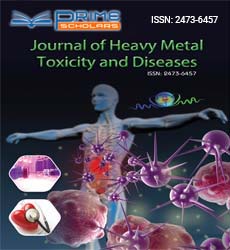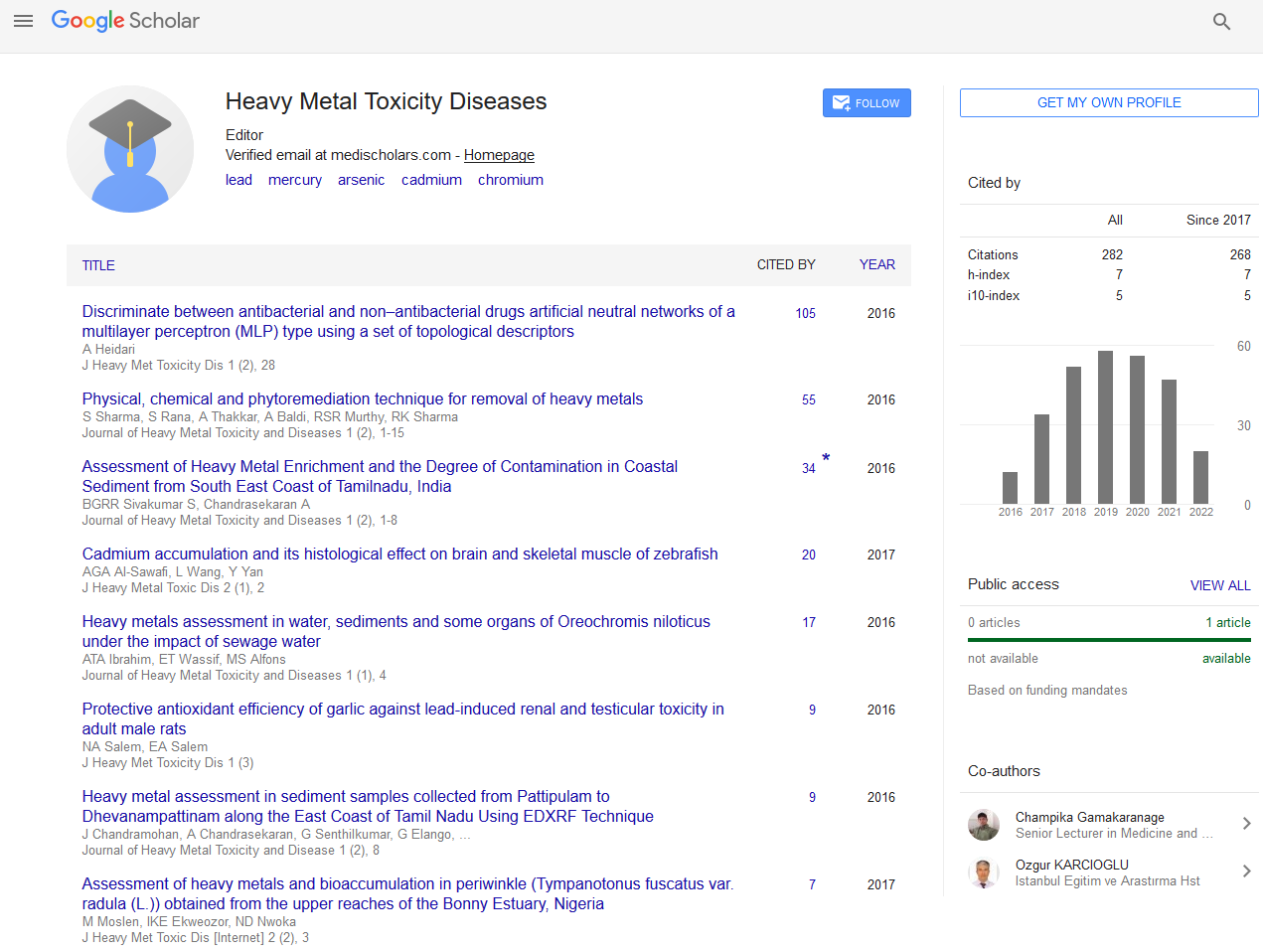Commentary - (2024) Volume 9, Issue 5
Toxicity beyond the Body: Mental Health Implications of Heavy Metal Exposure
Ping Wang*
Department of Health, Central South University, China
*Correspondence:
Ping Wang,
Department of Health, Central South University,
China,
Email:
Received: 01-Oct-2024, Manuscript No. ipjhmct-24-21863;
Editor assigned: 03-Oct-2024, Pre QC No. ipjhmct-24-21863 (PQ);
Reviewed: 17-Oct-2024, QC No. ipjhmct-24-21863;
Revised: 22-Oct-2024, Manuscript No. ipjhmct-24-21863 (R);
Published:
29-Oct-2024, DOI: 10.21767/2473-6457.24.5.50
Description
Heavy metal toxicity is a growing concern, with significant
implications for physical health. However, the psychological
effects, particularly anxiety and depression, are often
overlooked. This article explores the relationship between heavy
metal exposure and mental health, highlighting the mechanisms
involved, the populations at risk, and potential interventions.
Heavy metals, including lead, mercury, cadmium, and arsenic,
are naturally occurring elements that can have toxic effects on
human health. These metals are found in various environmental
sources, such as industrial pollution, contaminated water, and
certain food products. Chronic exposure to heavy metals can lead
to a range of health issues, but emerging research indicates that
mental health may also be significantly affected. Recent studies
have suggested a strong association between heavy metal
exposure and the onset of anxiety and depression. Heavy metals
can disrupt normal brain function by causing neuroinflammation
and oxidative stress. Chronic exposure to heavy metals can
lead to cognitive decline, which may contribute to anxiety and
depression. Impaired cognitive function can increase feelings
of helplessness and frustration, further exacerbating mental
health issues. Heavy metals can interfere with the endocrine
system, leading to hormonal imbalances that may affect mood
and emotional regulation. For instance, disruptions in thyroid
hormones due to heavy metal exposure can influence mood
stability. Exposure to heavy metals may alter the body’s stress
response. Dysregulation of this system may lead to heightened
anxiety and depressive symptoms. Developing brains are more
susceptible to the neurotoxic effects of heavy metals. Studies
have shown that children with elevated blood lead levels
often exhibit higher rates of behavioural problems, anxiety,
and depression. Heavy metal exposure during pregnancy can
affect foetal development, leading to long-term psychological
consequences. Infants exposed to metals in utero may be
at increased risk for developmental delays and emotional
issues. Workers in industries such as mining, construction, and
manufacturing may face higher levels of exposure to heavy
metals. This population often reports elevated levels of anxiety
and depression, linked to both the physical hazards of their
work and the mental strain of dealing with potential health
risks. Reducing the body’s burden of heavy metals through
chelation therapy or dietary changes can help alleviate some
of the psychological symptoms. Nutritional support, including
antioxidants and anti-inflammatory foods, can also play a role
in recovery. Support groups may also provide a platform for
sharing experiences and reducing feelings of isolation. Increased
awareness and screening for heavy metal exposure can lead to
early intervention. Communities can benefit from educational
campaigns that inform individuals about the risks associated with
heavy metals and how to minimize exposure. Ongoing research
is essential to better understand the relationship between heavy
metal exposure and mental health. Longitudinal studies can
help identify the long-term psychological effects of exposure
and inform treatment strategies. The psychological effects of
heavy metal exposure, particularly anxiety and depression,
are critical issues that require attention. By understanding the
mechanisms involved and recognizing at-risk populations, we can
take meaningful steps toward prevention and treatment. Public
awareness, effective interventions, and continued research will
be key in addressing the mental health challenges associated
with heavy metal toxicity, ultimately promoting better health
outcomes for affected individuals.
Acknowledgement
None.
Conflict Of Interest
The author states there is no conflict of interest.
Citation: Wang P (2024) Toxicity beyond the Body: Mental Health Implications of Heavy Metal Exposure. J Heavy Met Toxicity Dis. 09:50.
Copyright: © 2024 Wang P. This is an open-access article distributed under the terms of the Creative Commons Attribution License, which permits unrestricted use, distribution, and reproduction in any medium, provided the original author and source are credited.

